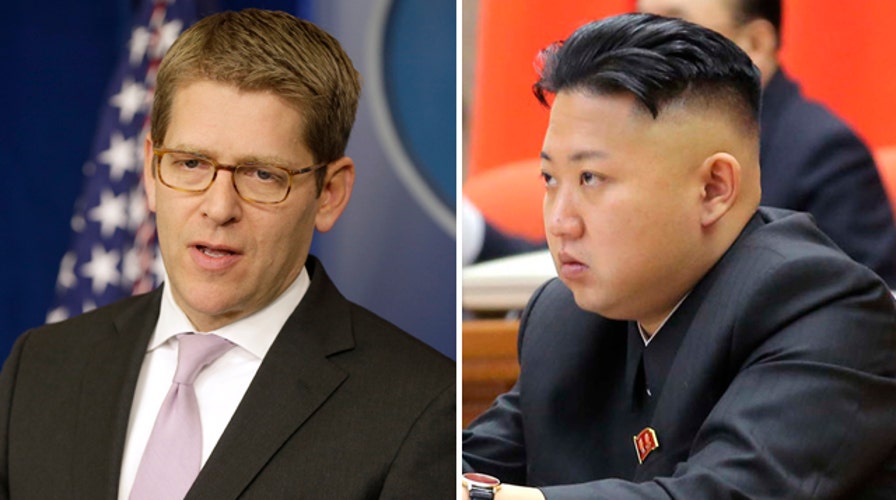White House looks to ease tensions with North Korea
Elizabeth Prann reports from Washington, D.C.
SEOUL, South Korea – South Korea's top military officer has put off a visit to Washington because of escalating tensions with North Korea that have also compelled more than a dozen South Korean companies to halt operations at a joint factory complex in the North, officials said Sunday.
South Korea's military is on heightened alert following North Korean threats to launch attacks on the U.S. and South Korea and produce more fuel for atomic weapons. Pyongyang is angry over ongoing South Korea-U.S. military drills and U.N. sanctions issued over North Korea's latest nuclear test.
South Korea's defense minister said last week that North Korea has moved at least one missile with a "considerable range" to its east coast, and speculated that the North may be planning to test it. The missile could possibly be the Musudan missile, capable of striking American bases in Guam with its estimated range of up to 4,000 kilometers (2,490 miles).
The tensions led South Korean Joint Chiefs of Staff Chairman Gen. Jung Seung-jo to cancel his plan to meet with U.S. counterpart, Gen. Martin Dempsey, in Washington on April 16 for regular talks.
The allies have agreed to reschedule the meeting because Jung couldn't be away from South Korea for several days at a time when North Korea is intensifying its rhetoric, said a South Korean Joint Chiefs spokesman who spoke on condition of anonymity, citing office policy.
The U.S. Defense Department has delayed an intercontinental ballistic missile test that had been planned for next week because of concerns the launch could be misinterpreted and exacerbate the Korean crisis, a senior defense official told The Associated Press Saturday.
Defense Secretary Chuck Hagel decided to delay the test at an Air Force base in California until sometime next month, said the official, who was not authorized to speak publicly about the test delay and requested anonymity.
Previously, the U.S. had followed provocations from North Korea with shows of force connected to the joint exercises with South Korea. It has sent nuclear capable B-2 and B-52 bombers and stealth F-22 fighters to participate in the drills.
In addition, the U.S. said last week that two of the Navy's missile-defense ships were moved closer to the Korean Peninsula, and a land-based missile-defense system is being deployed to the Pacific territory of Guam later this month. The Pentagon last month announced longer-term plans to strengthen its U.S.-based missile defenses.
Washington is taking the North Korean threats seriously, though U.S. leaders say they have seen no signs that the North is preparing for a large-scale attack.
North Korea successfully shot a satellite into space in December and conducted its third nuclear test in February. It has threatened to launch a nuclear attack on the United States, though many analysts, say the North hasn't achieved technology to manufacture a miniaturized nuclear warhead that could fit on a long-range missile capable of hitting the U.S.
North Korea also raised tensions Wednesday when it barred South Koreans and supply trucks from entering the Kaesong industrial complex, where South Korean companies have employed thousands of North Korean workers for the past decade.
North Korea is not forcing South Korean managers to leave the factory complex, and nearly 520 of them remained at Kaesong on Sunday. But the entry ban at the park, the last remaining inter-Korean rapprochement project, is posing a serious challenge to many of the more than 120 South Korean firms there because they are running of raw materials and suffering lack of replacement workers.
Nine more firms, including food and textile companies, have stopped operations at Kaesong, bringing to 13 the total number of companies that have done so, South Korea's Unification Ministry said in a statement Sunday.
North Korea also briefly restricted the heavily fortified border crossing at Kaesong in 2009 -- also during South Korea-U.S. drills -- but manufacturers fear the current border shutdown could last longer.

